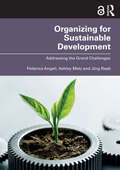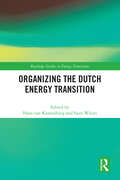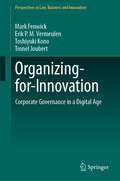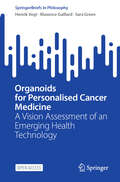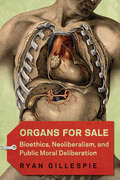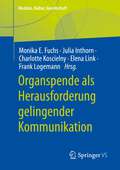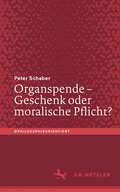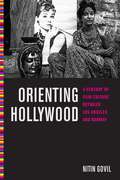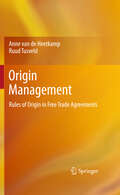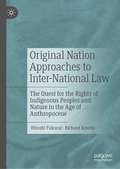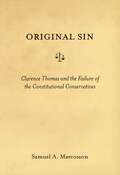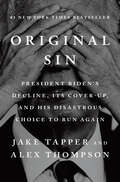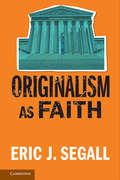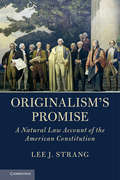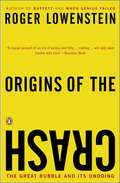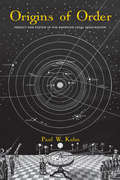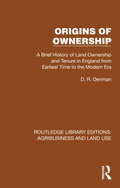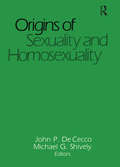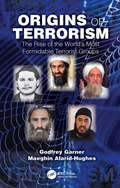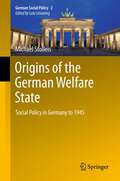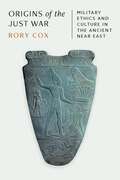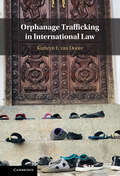- Table View
- List View
Organizing for Sustainable Development: Addressing the Grand Challenges
by Federica Angeli Ashley Metz Jörg RaabThe Sustainable Development Goals (SDGs) recognize the increasingly complex, interdependent nature of societal and environmental issues for governments and business. Tackling such "grand challenges" requires the concerted action of a multitude of organizations and multiple stakeholders at different levels in the public, private, and non-profit sector. Organizing for Sustainable Development provides an integrated and comparative overview of the successes and failures of organizational efforts to tackle global societal issues and achieve sustainable development. Summarizing years of study by an interdisciplinary board of authors and contributors, this book provides readers with an in-depth understanding of how existing businesses and new hybrid organizations can achieve sustainable development to bring about an improved society, marking a key contribution to the literature in this field. Combining theoretical views with empirical approaches, the chapters in this book are highly relevant to graduate and undergraduate (multidisciplinary) programs in sustainable development, organization studies, development economics, development studies, international management, and social entrepreneurship.
Organizing for Sustainable Development: Addressing the Grand Challenges
by Federica Angeli Ashley Metz Jörg RaabThe Sustainable Development Goals (SDGs) recognize the increasingly complex, interdependent nature of societal and environmental issues for governments and business. Tackling such "grand challenges" requires the concerted action of a multitude of organizations and multiple stakeholders at different levels in the public, private, and non-profit sector.Organizing for Sustainable Development provides an integrated and comparative overview of the successes and failures of organizational efforts to tackle global societal issues and achieve sustainable development. Summarizing years of study by an interdisciplinary board of authors and contributors, this book provides readers with an in-depth understanding of how existing businesses and new hybrid organizations can achieve sustainable development to bring about an improved society, marking a key contribution to the literature in this field.Combining theoretical views with empirical approaches, the chapters in this book are highly relevant to graduate and undergraduate (multidisciplinary) programs in sustainable development, organization studies, development economics, development studies, international management, and social entrepreneurship.The Open Access version of this book, available at www.taylorfrancis.com, has been made available under a Creative Commons Attribution-NonCommercial (CC-BY) 4.0 license.
Organizing the Dutch Energy Transition (Routledge Studies in Energy Transitions)
by Hans Van Kranenburg Sjors WitjesThis book addresses learnings from the energy transition in the Netherlands.This book brings together contributions from experts in academia and practice to the Dutch energy transition by sharing their knowledge and experience gained over many years and from different roles and responsibilities. The chapters are clustered around four key perspectives – Policy, Sector, Organization, and Future – and explore the impact of policy decisions of governments and strategic decisions of firms operating in the energy sector on the energy transition process. The different perspectives present many promising strategies, policies, and innovations on each aspect, resulting in a deeper understanding of how each of these strategies, policies, and innovations may hinder or contribute to foster the energy transition. It concludes with a reflection on lessons learned and specific managerial and policy recommendations.This volume will be of great interest to students, scholars, and industry professionals researching and working in the areas of energy transitions, sustainable business, energy technology, and energy policy.
Organizing-for-Innovation: Corporate Governance in a Digital Age (Perspectives in Law, Business and Innovation)
by Mark Fenwick Toshiyuki Kono Erik P.M. Vermeulen Tronel JoubertThis book argues that large corporations need to implement governance practices and processes that make them better innovators and that the challenge is to identify organizational principles and practices that provide the best chance of delivering innovative products to create a meaningful consumer experience. In this context, it is important to recognize that when we address organizational forms, we are not thinking of corporate governance in the sense of managing agency costs and ensuring regulatory compliance, but the more pressing business task of putting in place organizational systems and processes that facilitate value creation through continued and sustained innovation. The book examines how the contemporary concept and discourse of corporate governance may be obsolete or, at least, is increasingly disconnected from the needs and realities of the most innovative firms today. The concept of organizing for innovation—identifying process and practices that deliver the best opportunities for innovation—needs to take centre stage. This book aims to contribute to the nascent debate in this area by bringing together a series of chapters that examine various issues related to organizing for innovation.
Organoids for Personalised Cancer Medicine: A Vision Assessment of an Emerging Health Technology (SpringerBriefs in Philosophy)
by Sara Green Henrik Vogt Maxence GaillardThis open access book builds on and updates work performed in the HYBRIDA project, funded by the EU to develop an ethical framework for organoid research. Organoids are three-dimensional stem cell constructs that mimic organs of the body or tumours. Patient-derived organoids are envisioned to be grown from individual patients&’ tumours and used to tailor the most effective and safest treatments in a new form of personalized medicine. This text offers a critical assessment of this vision from the perspective of philosophy of medicine. The authors present a tailored &“vision assessment&”, presented as examples of methodological development, and applied to objects. They first analyse and describe the vision of using organoids for personalized cancer medicine, then critically evaluate this vision and finally comment on ethical implications of the epistemological issues and how to handle them. The authors further draw on sources for empirical inquiries. This book presents an exercise in health technology assessment conducted by philosophers. Its core readership are philosophers of medicine and bioethicists interested in personalized medicine and stem cell research.
Organs for Sale: Bioethics, Neoliberalism, and Public Moral Deliberation
by Ryan GillespieOrgans for Sale is a study of the bioethical question of how to increase human organ supply. But it is also an inquiry into public moral deliberation and the relationship between economic worth and the value systems of a society. Looking closely at human organ procurement debates, the author offers a critique of neoliberalism in bioethics and asks what kind of society we truly want. While society has shown concern over debates surrounding organ procurement, a better understanding of the rhetoric of advocates and philosophical underpinnings of the debate might indeed improve our public moral deliberation in general and organ policy more specifically. Examining public arguments, this book uses a range of source material, from medical journals to congressional hearings to newspaper op-eds, to provide the most up-to-date and thorough analysis of the topic. Organs for Sale posits that deciding together on the limits of markets, and on what is and ought to be for sale, sheds light on the moral fibre of our society and what it needs to thrive.
Organspende als Herausforderung gelingender Kommunikation (Medizin, Kultur, Gesellschaft)
by Elena Link Julia Inthorn Monika E. Fuchs Charlotte Koscielny Frank LogemannKommunikation im Kontext der Organspende gehört zu den sensibelsten und herausforderndsten Aufgaben im Klinikalltag. Angehörige und medizinisches Fachpersonal begegnen sich in einer äußerst belastenden Phase der Unsicherheit, Trauer und Verletzlichkeit. Dennoch müssen sie gemeinsam klären, ob ein Organspendeausweis vorliegt und das bereits intensivmedizinisch betreute Familienmitglied einer Organspende zustimmen würde. Die Interessen der Beteiligten unterscheiden sich und treffen sich zugleich in der Zielsetzung, den Willen des Patienten mit dieser Entscheidung umzusetzen. Der interdisziplinär angelegte Band reflektiert die im Feld bestehenden Kontingenzen. Er zielt auf eine Präzisierung der Wahrnehmung und erörtert Handlungsoptionen, die dazu beitragen können, diese spezifische Kommunikationssituation konkret zu entlasten.
Organspende – Geschenk oder moralische Pflicht? (#philosophieorientiert)
by Peter SchaberHaben wir eine moralische Pflicht, unsere Organe postmortal zu spenden? Oder handelt es sich dabei lediglich um einen Akt, der zwar wünschenswert, aber nicht gefordert ist? Und wie soll die Organspende geregelt werden? Soll man sich an der Zustimmungs- oder an der Widerspruchslösung orientieren und was genau sehen diese Regelungen jeweils vor? Und welche Rolle im Entscheidungsprozess soll den hinterbliebenen Angehörigen zukommen? Schaber argumentiert dafür, dass wir eine moralische Pflicht haben, unsere Organe postmortal zur Verfügung zu stellen, und dass die Organentnahme nach Maßgabe einer von ihm sogenannten ‚Erklärungslösung‘ geregelt werden sollte: Der Staat müsste die Bürger*innen regelmäßig darauf hinweisen, sich zur Organspende zu äußern, falls keine Bereitschaft zur Organentnahme vorliegt.
Orienting Hollywood: A Century of Film Culture between Los Angeles and Bombay (Critical Cultural Communication #6)
by Nitin GovilA new understanding of the culturally rich and historic relationship between Hollywood and Bollywood. With American cinema facing intense technological and financial challenges both at home and abroad, and with Indian media looking to globalize, there have been numerous high-profile institutional connections between Hollywood and Bombay cinema in the past few years. Many accounts have proclaimed India’s transformation in a relatively short period from a Hollywood outpost to a frontier of opportunity.Orienting Hollywood moves beyond the conventional popular wisdom that Hollywood and Bombay cinema have only recently become intertwined because of economic priorities, instead uncovering a longer history of exchange. Through archival research, interviews, industry sources, policy documents, and cultural criticism, Nitin Govil not only documents encounters between Hollywood and India but also shows how connections were imagined over a century of screen exchange. Employing a comparative framework, Govil details the history of influence, traces the nature of interoperability, and textures the contact between Hollywood and Bombay cinema by exploring both the reality and imagination of encounter.
Origin Management: Rules of Origin in Free Trade Agreements
by Ruud Tusveld Anne van de HeetkampOrigin Management describes a holistic approach that allows internationally operating companies to benefit from reduced import duty rates within Free Trade Agreements (FTAs). Through the creation of a single, auditable, and global platform, companies are enabled to successfully claim preferential origin and sustain, review and audit preferential treatment claims. Seeking to provide a comprehensive treatment of origin management for a professional audience, this book outlines the underlying theoretical concepts and legislative frameworks, and presents practical implications and guidelines for a successful origin management program as part of a strategic sourcing initiative. The authors advocate an approach that involves sharing and distributing information and resources throughout the company and the supply chain, resulting in competitive advantages, synergies, and a central information point for all origin associated issues.
Original Nation Approaches to Inter-National Law: The Quest for the Rights of Indigenous Peoples and Nature in the Age of Anthropocene
by Hiroshi Fukurai Richard KroothThis book introduces the Original Nation scholarship to examine the historical genealogy of the nation’s struggles against the state. A fundamentally different portrait of history, geography, politics, and the role of law emerges when the perspective of the nation and peoples is placed at the center of geopolitical analysis of global affairs. In contrast to traditional and canonical state-centric narratives, the Original Nation scholarship offers a diametrically distinct “on-the-ground” and “bottom-up” portrait of the struggle, resistance, and defiance of the nation and peoples. It exposes persistent global patterns of genocide, ecocide, and ethnocide that have resulted from attempts by the state to occupy, suppress, exploit, and destroy the nation. The Original Nation scholarship offers a powerful and widely applicable intellectual tool to examine the history of resilience, emancipatory struggles, and collective efforts to build a vibrant alternative world among the nation and peoples across the globe.
Original Sin: Clarence Thomas and the Failure of the Constitutional Conservatives (Critical America #33)
by Samuel A. MarcossonOriginalism is the practice of reviewing constitutional cases by seeking to discern the framers' and ratifiers' intent. Original Sin argues that the "jurisprudence of original intent," represented on the current Supreme Court by Justices Antonin Scalia and Clarence Thomas, has failed on its own terms. Attempts to determine the framers' intent have not brought greater determinacy and legitimacy to the process of constitutional interpretation. Instead, the method has been marked by the very flaws—including self-interested reasoning and the manipulation of doctrine—that originalists argue marred the jurisprudence of the judicial "activists" of the Warren Court. Original Sin brings a rigorous review of the performance of the "new originalists" to the debate, applying their methodology to real cases. Marcosson focuses on the judicial decisions of Clarence Thomas, an avowed originalist who nevertheless advocates "color blind" readings of the Constitution which are at odds with the framers' ideas concerning anti-miscegenation and other laws. After critiquing what he sees as a troubling use of originalism and explaining why it has failed to provide a consistent basis for constitutional decision-making, the author goes on to offer an alternative approach: one that lends greater legitimacy to the Court's interpretations of the Constitution.
Original Sin: President Biden's Decline, Its Cover-Up, and His Disastrous Choice to Run Again
by Jake Tapper Alex ThompsonFrom two of America’s most respected journalists, an unflinching and explosive reckoning with one of the most fateful decisions in American political history: Joe Biden’s run for reelection despite evidence of his serious decline—amid desperate efforts to hide the extent of that deterioration. <br> "Explosive." —The New York Times <br> "[The] most significant book to date about Biden’s cognitive decline." — The Atlantic <br> "Superbly reported . . . Reads like a Shakespearean drama on steroids." — Los Angeles Times <P> In Greek tragedy, the protagonist’s effort to avoid his fate is what seals his fate. In 2024, American politics became a Greek tragedy. Joe Biden launched his successful 2020 bid for the White House with the stated goal of saving the nation from a second Trump presidential term. He, his family, and his senior aides were so convinced that only he could beat Trump again, they lied to themselves, allies, and the public about his condition and limitations. At his debate with Trump on June 27, 2024, the consequences of that deception were exposed to the world. It was shocking and upsetting. <P> Now the full, unsettling truth is being told for the first time. Jake Tapper and Alex Thompson take us behind closed doors and into private conversations between the heaviest of hitters, revealing how big the problem was and how many people knew about it. From White House staffers at the highest to lowest levels, to leaders of Congress and the Cabinet, from governors to donors and Hollywood players, the truth is finally being told. What you will learn makes President Biden’s decision to run for reelection seem shockingly narcissistic, self-delusional, and reckless—a desperate bet that went bust—and part of a larger act of extended public deception that has few precedents. <P> The story the authors tell raises fundamental issues of accountability and responsibility that will continue for decades. The irony is biting: In the name of defeating what they called an existential threat to democracy, Biden and his inner circle ensured it, tossing aside his implicit promise to serve for only one term, denying the existence of health issues the nation had been watching for years, dooming the Democrats to defeat. The decision to run again, the Original Sin of this president, led to a campaign of denial and gaslighting, leading directly to Donald Trump's return to power and all that has happened as a consequence. Rarely does hubris meet nemesis more explosively. Wherever you stand on the political spectrum, Original Sin is essential reading. <b>New York Times Bestseller</b>
Originalism and the Good Constitution
by John O. Mcginnis Michael B. RappaportOriginalism holds that the U. S. Constitution should be interpreted according to its meaning at the time it was enacted. In their innovative defense of originalism, John McGinnis and Michael Rappaport maintain that the text of the Constitution should be adhered to by the Supreme Court because it was enacted by supermajorities--both its original enactment under Article VII and subsequent Amendments under Article V. A text approved by supermajorities has special value in a democracy because it has unusually wide support and thus tends to maximize the welfare of the greatest number. The authors recognize and respond to many possible objections. Does originalism perpetuate the dead hand of the past? How can following the original meaning be justified, given that African Americans and women were excluded from the enactment of the Constitution in 1787 and many of its subsequent Amendments? What is originalism's place in interpretation of the Constitution, when after two hundred years there is so much non-originalist precedent? A fascinating counterfactual they pose is this: had the Supreme Court not interpreted the Constitution so freely, perhaps the nation would have resorted to the Article V amendment process more often and with greater effect. Their book will be an important contribution to the literature on originalism, which is now the most prominent theory of constitutional interpretation.
Originalism as Faith
by Eric J. SegallOriginalism as Faith presents a comprehensive history of the originalism debates. It shows how the doctrine is rarely used by the Supreme Court, but is employed by academics, pundits and judges to maintain the mistaken faith that the Court decides cases under the law instead of the Justices' personal values. Tracing the development of the doctrine from the founding to present day, Eric J. Segall shows how originalism is used by judges as a pretext for reaching politically desirable results. The book also presents an accurate description and evaluation of the late Justice Scalia's jurisprudence and shows how he failed to practice the originalism method that he preached. This illuminating work will be of interest to lawyers, law students, undergraduates studying the Court, law professors and anyone else interested in an honest discussion and evaluation of originalism as a theory of constitutional interpretation, a political weapon, and an article of faith.
Originalism's Promise: A Natural Law Account of the American Constitution
by Lee J. StrangThe foundation of the American legal system and democratic culture is its longstanding written Constitution. However, a contentious debate now exists between originalists, who employ the Constitution's original meaning, and Nonoriginalists, who argue for a living constitution interpretation. The first natural law justification for an originalist interpretation of the American Constitution, Originalism's Promise presents an innovative foundation for originalism and a novel description of its character. The book provides a deep, rich, and practical explanation of originalism, including the most-detailed originalist theory of precedent in the literature. Of interest to judges, scholars, and lawyers, it will help all Americans better understand their own Constitution and shows why their reverence for it, its Framers, and its legal system, is supported by sound reasons. Originalism's Promise is a powerful contribution to the most important theory in constitutional interpretation.
Origins Of The Crash: The Great Bubble And Its Undoing
by Roger LowensteinWith his singular gift for turning complex financial events into eminently readable stories, Roger Lowenstein lays bare the labyrinthine events of the manic and tumultuous 1990s. In an enthralling narrative, he ties together all of the characters of the dot-com bubble and offers a unique portrait of the culture of the era. Just as John Kenneth Galbraith's The Great Crash was a defining text of the Great Depression, Lowenstein's Origins of the Crash is destined to be the book that will frame our understanding of the 1990s.
Origins of Order: Project and System in the American Legal Imagination (Yale Law Library Series in Legal History and Reference)
by Paul W. KahnAn examination of how two fundamental concepts of order influence our ideas about sovereignty, citizenship, law, and history Western accounts of natural and political order have deployed two basic ideas: project and system. In a project, order is produced by the intentional act of a subject; in a system, order is immanent in the world. In the former, order is made; in the latter, discovered. Paul W. Kahn shows how project and system have long been at work in our theological and philosophical tradition. Against this background, Kahn explains the development of the modern legal imagination in the nineteenth century as a movement from project to system. Americans began the century imagining the constitutional order as their common project: a deliberate construction of We the People. They ended the century imagining that order is continuous with the common law: an immanent development of the principles of civilization. This imaginative shift affected ideas of legal text, sovereignty, citizenship, interpretation, history, and science.
Origins of Ownership: A Brief History of Land Ownership and Tenure from Earliest Time to the Modern Era (Routledge Library Editions: Agribusiness and Land Use #4)
by D. R. DenmanThe English systems of land tenure have influenced land-holding far beyond Britain. Freehold, for example, a common-place in many places, has its origin in the feudal tenure of Anglo-Norman England. Much has been written about the origins of English land ownership but the contributions are hidden. This book, originally published in 1958 draws together legal, economic and social historical themes, introducing the reader to the authoritative texts of the many aspects of the subject up until the 16th Century.
Origins of Possession
by Philippe RochatHuman possession psychology originates from deeply rooted experiential capacities shared with other animals. However, unlike other animals, we are a uniquely self-conscious species concerned with reputation, and possessions affect our perception of how we exist in the eyes of others. This book discusses the psychology surrounding the ways in which humans experience possession, claim ownership, and share from both a developmental and cross-cultural perspective. Philippe Rochat explores the origins of human possession and its symbolic development across cultures. He proposes that human possession psychology is particularly revealing of human nature, and also the source of our elusive moral sense.
Origins of Sexuality and Homosexuality
by John Dececco, Phd Michael ShivelyThis well-documented book highlights some of the theories of bisexual and homosexual identities and their conceptual bases in cultural history, moral philosophy, biology, and social psychology. Some of the most respected minds in the field of human sexuality challenge traditional views on homosexuality and question the moral principles implicit in many existing psychiatric and psychological theories.
Origins of Terrorism: The Rise of the World’s Most Formidable Terrorist Groups
by Godfrey Garner Maeghin Alarid-HughesOrigins of Terrorism: The Rise of the World’s Most Formidable Terrorist Groups examines the roots of Islamic terrorism, it’s history, and some of the foundational figures in prominent terrorist organizations. Throughout, the book also addresses the use of terrorism, the "hows" and "whys" of terrorists’ goals, and their modus operandi.Historically, insurgency operations have formed the basis of a number of terrorist groups—resistance to western powers, particularly the United States, and what is viewed as their unwanted interference in regional affairs. Sections are devoted to individual terror organizations, including some of the most well-known and resilient global movements—Al Qaeda, ISIS, the Taliban, and Boko Haram, among others. Coverage details where and how they originated, who the principal organizers were, how these individuals worked—or didn’t work—together. In this, the authors look at the circumstances that allowed for these leaders, and their groups’, development and success. In this, the authors expose interesting, little-known stories and facts about the specific upbringing, family life, and personal narrative around these organizations’ founders, as well as ties to other terrorist founders and organizations. For example, the relationship between individuals such as Osama bin Laden and Musab al Zarkawi (aka Ahmad al-Khalayleh)—the founder of ‘Al Qaeda in Iraq’ (AQI), which became ISIS—is examined in detail, providing readers with some of the "stories behind the stories" to understand the prominent figures and underpinnings of major terrorist organizations’ philosophies, formation, and elements that have led to their staying power.Origins of Terrorism will be a valuable resource for security and intelligence professionals, terrorism researchers, and students, providing a unique perspective to understand terrorism and terror movements in considering counterterror efforts.
Origins of the German Welfare State
by Michael StolleisThis book traces the origins of the German welfare state. The author, formerly director at the Max-Planck-Institute for European Legal History, Frankfurt, provides a perceptive overview of the history of social security and social welfare in Germany from early modern times to the end of World War II, including Bismarck's pioneering introduction of social insurance in the 1880s. The author unravels "layers" of social security that have piled up in the course of history and, so he argues, still linger in the present-day welfare state. The account begins with the first efforts by public authorities to regulate poverty and then proceeds to the "social question" that arose during the 19th-century Industrial Revolution. World War I had a major impact on the development of social security, both during the war and after, through the exigencies of the war economy, inflation and unemployment. The ruptures as well as the continuities of social policy under National Socialism and World War II are also investigated.
Origins of the Just War: Military Ethics and Culture in the Ancient Near East
by Rory CoxA groundbreaking history of the ethics of war in the ancient Near EastOrigins of the Just War reveals the incredible richness and complexity of ethical thought about war in the three millennia preceding the Greco-Roman period, establishing the extent to which ancient just war thought prefigured much of what we now consider to be the building blocks of the Western just war tradition.In this incisive and elegantly written book, Rory Cox traces the earliest ideas concerning the complex relationship between war, ethics and justice. Excavating the ethical thought of three ancient Near Eastern cultures—Egyptian, Hittite and Israelite—he demonstrates that the history of the just war is considerably more ancient and geographically diffuse than previously assumed. Cox shows how the emergence of just war thought was grounded in a desire to rationalise, sacralise and ultimately to legitimise the violence of war. Rather than restraining or condemning warfare, the earliest ethical thought about war reflected an urge to justify state violence. Cox terms this presumption in favour of war ius pro bello—the “right for war”—characterizing it as a meeting point of both abstract and pragmatic concerns.Drawing on a diverse range of ancient sources, Origins of the Just War argues that the same imperative still underlies many of the assumptions of contemporary just war thought and highlights the risks of applying moral absolutism to the fraught ethical arena of war.
Orphanage Trafficking in International Law
by Kathryn E. van DooreOrphanage Trafficking in International Law explores the process of orphanage trafficking as a form of child trafficking in international law, examining the contexts in which it occurs and providing a comprehensive, holistic approach to addressing the issue as a form of trafficking. In doing so, this book establishes the method and process of orphanage trafficking as an issue of international concern. It reconceptualises the activity of orphanage tourism as a demand driver for child trafficking and a form of exploitation, and makes recommendations for how countries where orphanage trafficking occurs, as well as countries that contribute to orphanage trafficking via funding and volunteers, should tackle the issue.
